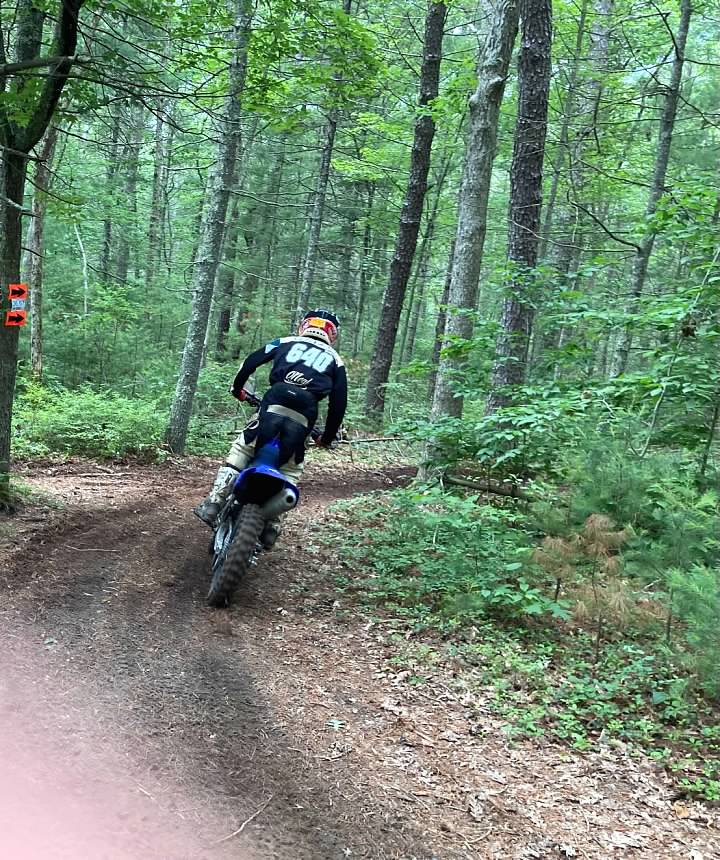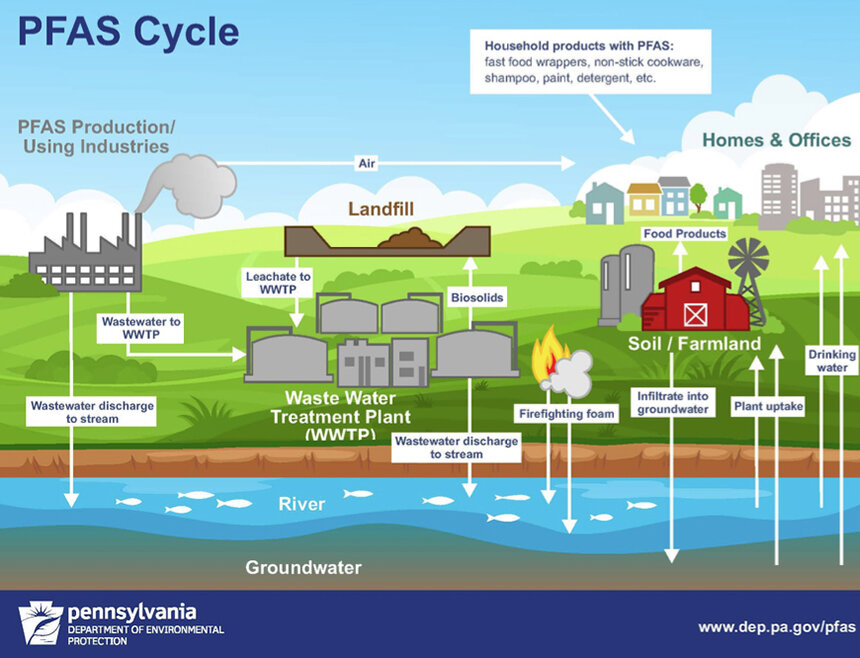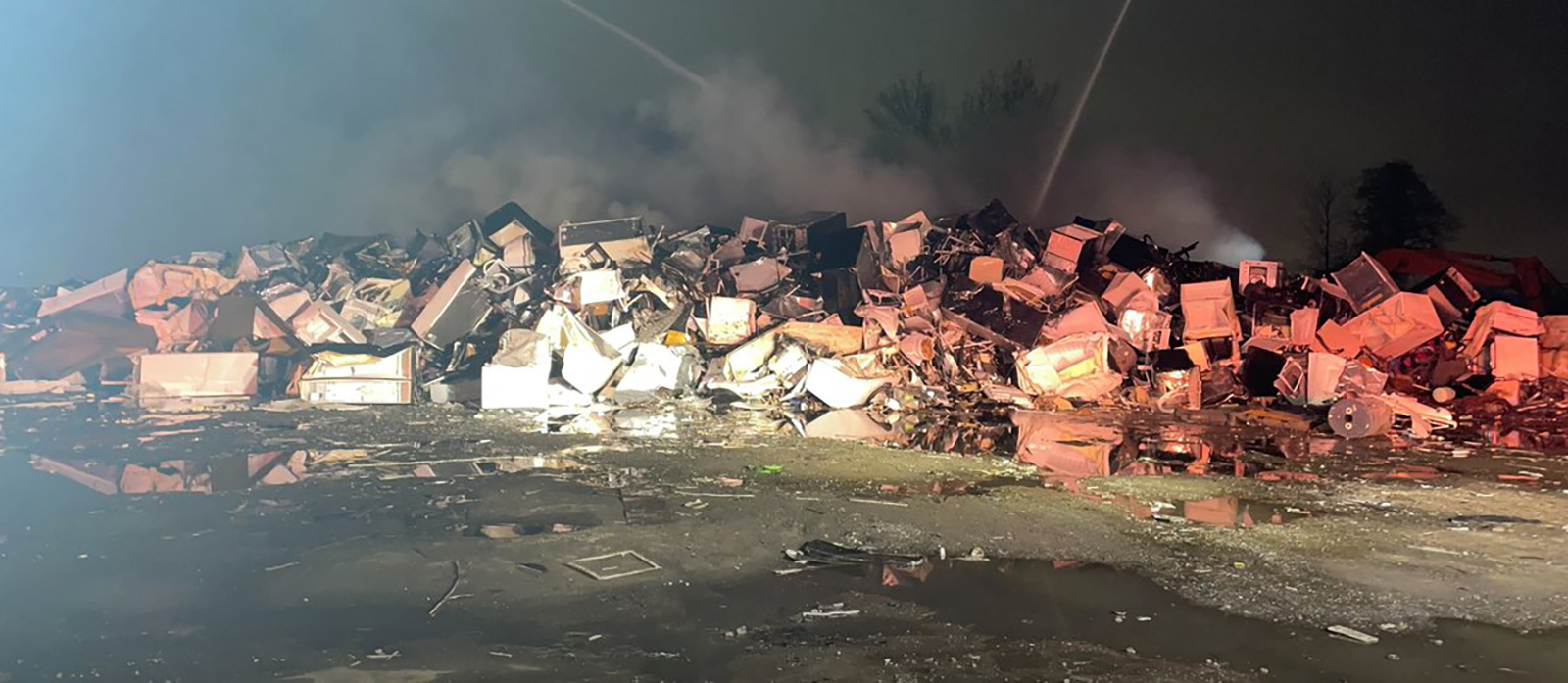Motorcycle Group Given Special Permission to Race Through Big River Management Area
July 2, 2022
WEST GREENWICH, R.I. — Within the Big River Management Area, the use of motorized vehicles is restricted, according to the area’s policies. But last month, the Rhode Island Department of Environmental Management (DEM) allowed Rhody Rovers MC to host an enduro motorcycle race at the largest publicly owned land parcel in the state.
DEM issues these permits for restricted activities “on a limited basis and with conditions,” according to Michael Healey, the agency’s chief public affairs officer. Special-use permits are free unless the event requires a police detail. Rhody Rovers did not need a detail for its June 19 race, according to DEM.
In an email to ecoRI News, Healey wrote DEM “allows special uses as a way to give the public access to our properties in a way that can be managed.” He noted Rhody Rovers was required to clean up after the event.
Rhody Rovers was responsible for “returning the location back to its prior condition” and “removal and disposal of trash before leaving the area each day.” It would be billed for any damage the group caused, according to the DEM-issued special permit.
Healey said the motorcycle group, which has been around since 1947, has worked with DEM to use and clean up state lands in the past.
“Rhody Rovers have been an exemplary partner at Big River,” he wrote. “We estimate that Rhody Rovers clear roughly 60 to 70 miles of trails every year at Big River. These are trails that many other recreational users of Big River, such as hikers, enjoy.”
Healey noted DEM manages 90,000 acres of land statewide but only has six full-time employees dedicated to maintenance. “It would be impossible for us to approach fulfilling our stewardship goals without partners such as Rhody Rovers,” he wrote.
Pete Tanner, a member of the Rhody Rovers, said there is a lengthy permitting process to be able to use the land and that the group must show proof of a “multimillion dollar” insurance policy to get approval.
Rhody Rovers has already been approved for two more racing events at Big River — July 24 and Oct. 15.

Margaret Parsons, whose property borders the management area, said she was shocked to see the motorcycles riding through the trails on Father’s Day.
She was in her back yard and started to hear noises, so she ventured onto the trails and saw the race taking place. Thinking that motorized vehicles weren’t allowed in the area, she had her husband called the police, who let her know the event was permitted. As she walked through the woods, she took pictures of the racers as they passed by her.
“The trails are narrow. It just doesn’t seem right to me that people should be speeding on those trails where there are people walking dogs and hiking,” Parsons said.
John Halloran, who lives just over the border in Killingly, Conn., has been hiking the trails in Big River for the past 10 years and said he also worries about the safety of motorcycles moving quickly through the area.
“You hear a sound, but you don’t necessarily know immediately where the sound is coming from, what direction, and since the trails are pretty tight, it’s not always easy to step off into open space, especially with people that ride mountain bikes,” Halloran said.
Tanner said his motorcycle group posts flyers on trail heads and in parking lots at least a week in advance of their races so other Big River users can seek alternate routes.
He said anyone who is concerned about motorcycles used on the trails is “misinformed.” We’ve been doing it for years,” said Tanner, noting the group commits to cleaning up and maintaining the trails they use beyond DEM requirements outlined in the permits.
“More people benefit from us being out there than our user group because there’s a lot of hikers and bicycle people,” he said.
The Big River Management Area consists of about 8,600 acres of open space, and its borders extend through portions of West Greenwich, East Greenwich, Coventry, and Exeter.
Largely undeveloped, the land was originally condemned for water supply purposes and is owned by the Rhode Island Water Resources Board.
Some 200 single-family homes on the property were taken by eminent domain beginning in the mid-1960s. The Water Resources Board now maintains leases on 39 residential properties, three commercial properties, and the state-owned portion of the Maple Root Corporation, a mobile home park.
In 1993, the General Assembly passed legislation declaring the Big River Management Area as open space, to be utilized and enjoyed by the public.
“To this end, several civic groups engage in activities ranging from sports, hiking, canoeing, military training and other recreational activities,” according to the Big River Management Area Policies enacted in 1997.
Hopkins Hill Sand & Stone, which blasts and mines next to the Big River Management Area, has been operating illegally since fall 2004. DEM has fined the company, but the quarry is still operating illegally and polluting the nearby conservation area while its appeal makes its way through the courts.




Well it seems like the area is being served by the motorcycle group which is commendable, however dirt bikes tend to loosen the ground up, which can result in erosion, then sedimentation in drainage areas and wetlands if trails aren’t sited properly. If these races include water crossings I’d suggest eliminating any water crossings to minimize streambank erosion and subsequent stream sedimentation. October is hunting season so I’m not sure this a compatible use in October. Not outraged but I haven’t seen the damage. Certainly doesn’t fit “wildlife” management if you ask me. I guess that’s why it’s Big River Management AreA.
Most if not all the trails in Big River area along with Arcadia where created by dirt bike riders throughout decades of use before outlawed. The history of dirt bike events held in Big River goes back decades along with recreational riding, until it was outlawed. The Rhody Rovers are a part of the New England Trail Riders Association, a group that holds events all across New England on private and public lands. Rhoddy Rovers are Insured and permitted and overseen by DEM…I see no reason why it should not be allowed.
What???!!!! Noise, pollution, tearing up the trails. This has no place in a DEM management area, not ever.
Mountain bikers and horseback have caused far more disturbance in state management areas. From cutting of new and illegal trails to causing erosion in sensitive areas. The limited number of motorized enduro events and “turkey runs” are authorized by special use permits, and have been going on for decades. When problems occur, certain trails are removed from the organized events. On the other hand, abuses by individuals in any user group get the entire community labeled as a problem.
These trails exist in the first place BECAUSE of dirt bikes. They have been doing this for like 70 years. It’s awesome DEM allows this in the controlled way that they do. DEM gets tons of free trail work out of the group as well. Big River exists because the state took a whole bunch of land under eminent domain for a reservoir that never happened. Busting the balls of the motor cycle people is just the wrong tree to bark up. They’re far far better stewards of Big River than the dog walkers and casual pedestrian users. No affiliation, this is just an extension of the conflict between all the different user groups.
From the perspective of a frequent runner and mountain biker in Big River, they totally destroyed quite a lot of trails. Real bummer. So many previously varied and technical trails are just totally ripped up; so there’s no traction uphill and you’re just slogging through the motorcycle ruts. There’s no way these are trails that we previously motorbiked because I’ve been riding for years and they’ve never looked close to this bad.
I have been running at Big River for years. The idea that the DEM “allows” these events is a joke. Especially in the southern portion of the management area, “illegal” motorized vehicles have been destroying the trails for equally as many years as I have been enjoying this special spot in our state. Not once, in visiting at all times of day, week, and year, have I seen an environmental police officer patrolling the area. From dirt bikes, four wheelers, snow mobiles, even Jeeps, I have seen the lot. My experience is the same as what “Mostly a Climber” describes: especially after the pandemic began, I noticed an exponential increase in trail damage and encounters with speeding motorbikes. Someone hiking the trails with their kids, dog, or just to take in the peace of the woods, should not have to deal with noise, fumes, or close passes by unlicensed, uninsured moto traffic. Whether it’s an event or a bunch of yahoos wanting to blow off steam, there are other places to do it. If they wanted risk they would take their kids for a walk on Division Street. DEM needs a complete overhaul, top to bottom. More officers, more patrols, heavier penalties, and better public education.
To address the “trail creation” tales of some other comments: it may be in the golden years of the 70s motorbikes created some trails. In 2022 it’s illegal. I wonder how much support you would get to reverse this decision? I would guess not enough. Just because something occurred in the past doesn’t mean it should happen today. Rhode Island is an environmental disaster, and we all have to share in its burden. We should stand up and take pride in our green spaces, rather than be complacent in their pollution!